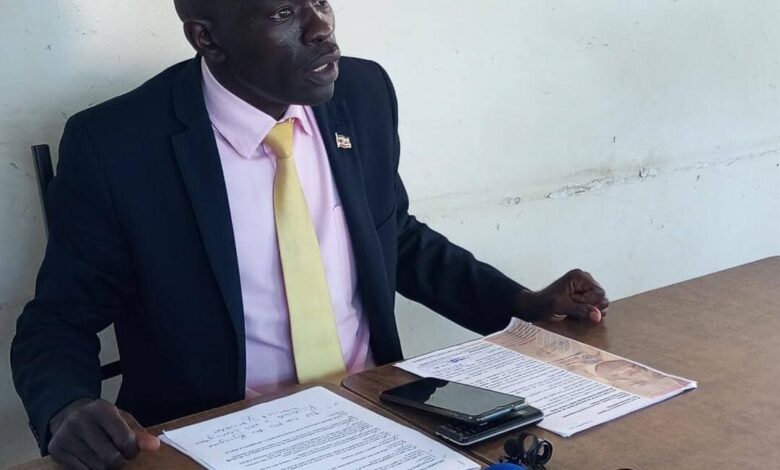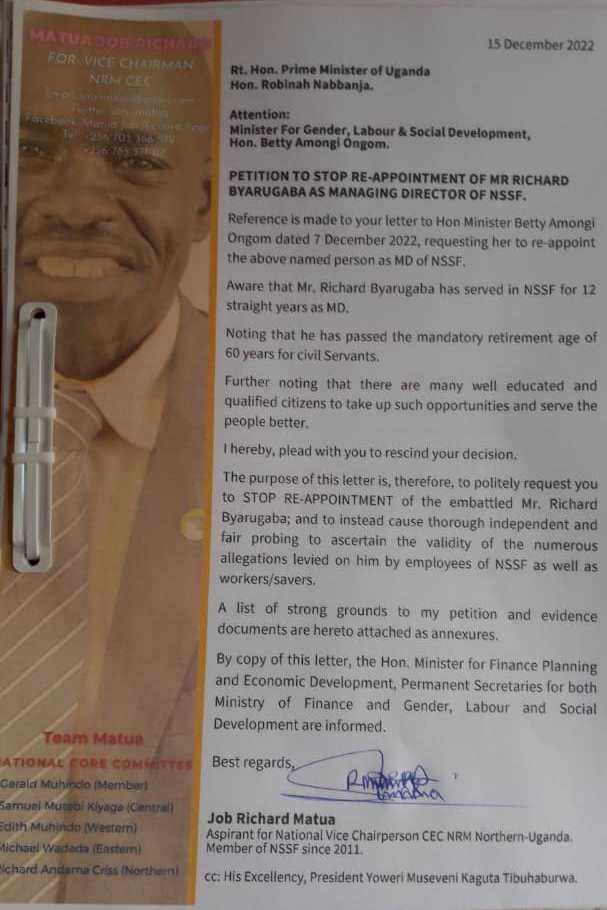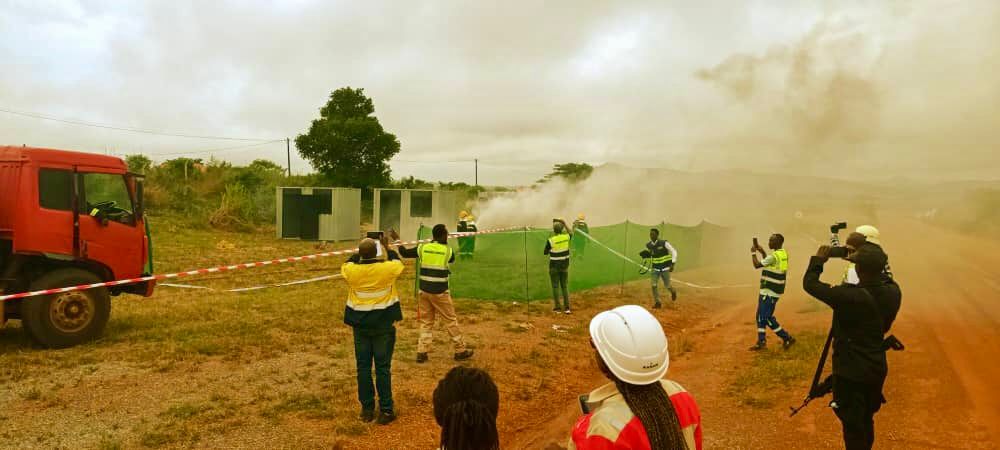NSSF’s Richard Byarugaba should retire in peace – saver petitions PM Nabbanja
His petition follows another to President Yoweri Museveni and Betty Amongi by over 100 employees of the NSSF, in which they called for detailed investigations of the conduct of Byarugaba as far as managing the Fund’s projects and the way contracts and procurement were made, among other grievances.

By Bakari Ssettumba
The number of voices against the reappointment of Richard Byarugaba as Managing Director for the National Social Security Fund (NSSF) is increasing each day, with the latest being a petition to Prime Minister Robinah Nabbanja filed by Job Richard Matua, a saver with the Fund since 2011 and aspirant for National Vice Chairperson CEC NRM Northern-Uganda.
Byarugaba’s contract expired on November 1st, 2022.
In the petition seen by Charmar News, Matua urges the Premier to rescind her directive to Betty Amongi the Minister of Gender, Labour and Social Development to reappoint Byarugaba despite clocking the mandatory retirement age.
According to Nabbanja’s letter dated December 7th, 2022, conclusive consultations on Byarugaba’s reappointment had been concluded.
“As you are equally aware, H.E. The President delegated me to conclusively handle this matter and provide an update. I am happy to note that comprehensive consultations with key stakeholders on the matter have taken place,” she wrote.
“A consensus has emerged that we should agree with the Board recommendations to give a five-year non–renewable performance contract to Mr Richard Byarugaba and Mr Patrick Ayota as Managing Director and Deputy Managing Director respectively,” the letter adds.
But according to Matua’s petition, Byarugaba – who has steered the sh17 trillion Fund since 2010, should be allowed to retire in peace to pave way for younger and fresh-minded people to run the affairs at the workers’ savings scheme.
Matua hinges his opposition of the reappointment on ten grounds including; Byarugaba’s reaching the retirement age of 60 years for ALL civil Servants, the difficulty in Midterm access to funds by Savers who are 45 years and above and have saved for 10 years and above, the need to investigate allegations of corruption in the award of contracts and management of NSSF projects, as well as abuse of Office and bad working relationship with NSSF employees as well as Conflicts of Interest in NSSF projects.

Other reasons are; the need to promote growth at the workplace in NSSF for employees to boost morale by allowing those that attain retirement age to retire so that their juniors can rise in positions, the need to create employment opportunities for the many Citizens who are highly educated and qualified for such jobs and can do it better, minority groups representing majority groups on the NSSF board, the need to investigate the relationship between Byarugaba and Board members of NSSF for possible connivance to cause his reappointment past retirement age as well as the overall reported misconduct of Byarugaba in management of affairs at NSSF.
“If at all he is to be reappointed, that appointment is not supposed to exceed two years on contract. Why is the Prime Minister wanting Mr Byarugaba to be reappointed for a five years’ term?” he queries.
“It is morally reprehensible. It is obscene Madam Prime Minister,” he adds.
Nabbanja argues that there’s a need to ensure continuation in the implementation of the Fund’s new strategy in light of the new NSSF act as recently amended.
Matua however dismisses this claim, arguing it instead creates impunity.
“That reasoning is laughable. There are workers at the NSSF at different levels. There’s a hierarchy there. Do you want to tell me the people there don’t know what they are doing?” he wondered.
Adding: “Can’t we find someone within the age bracket and is qualified enough to take over those positions?”
Matua also accuses Byarugaba of failing to bring more workers on board especially in the informal sector under the auspices of the NSSF during his long tenure.
His petition follows another to President Yoweri Museveni and Betty Amongi by over 100 employees of the NSSF, in which they called for detailed investigations of the conduct of Byarugaba as far as managing the Fund’s projects and the way contracts and procurement were made, among other grievances.







